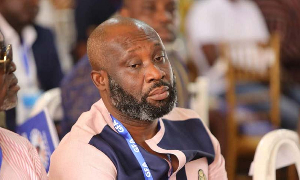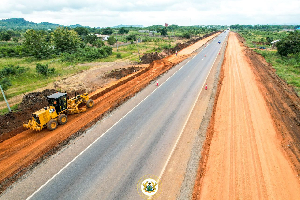INTRODUCTION
It is a truism that the December 2008 general elections has been regarded as the most unprecedented elections that Ghana has ever had in her entire political history or life. The campaigns in the run-up to the elections by the parties were conducted in a manner that was so astonishing to everyone. The mindset with which people viewed the elections heightened the tempo and cast a cliffhanger on Ghana’s future. To some, the elections were considered a “do or die” affair and no one was prepared to compromise on any grounds. However, it came to pass as Ghanaians ushered in a new government after a second round and a “third round” of ballot. Hence, it is prudent and appropriate for us to brainstorm, reflect and take stock of the happenings of the last elections in order to be better prepared and positioned for more credible, transparent and acceptable elections in future.
The thrust of this PNC paper, takes a look at the issue from, Security, Media, State of Multi-party Democracy, Voter Education, Spoilt Ballot, and of course the Electoral Commission and its mandate.
SECURITY
It is worth noting that elections all over the world to a very large extent owe their acceptability and credibility to the security arrangements and the conduct of security personnel or officers. Irrespective of the fact that security officers have the right of covert allegiance to any political party, it is imperative and binding on them to conduct themselves in their duties with due diligence and professionalism. However these key virtues or elements were completely missing in the heat of the nerve-wracking 2008 elections and indeed during previous elections. This disgraceful trend manifested itself in how some security personnel openly fought in a bid to defend and pursue the interest of one political party or another. This rather unfortunate situation has the tendency of marring the beauty of our elections by casting a doubt on their credibility, transparency, and acceptability. In this regard, utmost premium has to be placed on instilling diligence and professionalism in our security officers at all times and especially for the purposes of our elections in order to avoid any kind of misconduct from them which might jeopardize mother Ghana. We urge adequate “schooling” for our security agencies reminding them that they are a national security and not a party in power security.
MEDIA
Generally, we commend the media for their coverage of the elections and in some cases their meticulous manner the conducted themselves. Nevertheless, one significant negative incident that cropped up during the last elections and which needs serious attention is the speculative reportage that emanated from the media fraternity. A quick or vivid scan of events during the heated atmosphere of the last elections would reveal that the media generated and subsequently fed the general public with so much speculative reportage which ended up as half-truths or even non-truths (e.g. when websites of state media feed with results that turnout to be absolutely wrong). The controversies that arose and the subsequent tensions that mounted were very scary and capable of rendering the verdict of the elections doubtful to many people. Since we would not like to have any such experience in future, it is incumbent on the stakeholders that be, to intensively sensitize the media and get these media houses involved in the preparatory and execution processes of the elections to ensure that media practitioners have a deep insight into the conduct of the elections. This would ensure a massive reduction in the speculative and unprofessional reportage that characterizes our elections.
STATE OF MULTIPARTY DEMOCRACY
We cannot effectively brainstorm on an exercise of this nature and magnitude without taking a serious look at the disparity gap that exist between the two major parties and the other smaller parties. Within the framework of the multi-party democracy that we claim to be practising as a nation, it is imperative that we take pragmatic steps towards strengthening and survival of all political parties especially those with relatively small following. The survival and continuous participation of these parties in our elections undoubtedly brings variety and lays credence to the transparency and acceptability of the elections. Hence, it is fervently hoped that the logistical constraints that perennially face these parties would be diversely addressed so as to make them stronger forces within our electoral system. That is why we find it rather strange that in terms of allocating vehicles and other logistics, the two major parties which have so much already are given more than the smaller parties which are more constrained.
An added and probably more potent case for sustaining multi-party democracy is for State/Public Funding of political parties. Over the years, and in conjunction with the IEA, parties have tossed the issue all sides round and concluded that it was the most plausible thing to do. This consensus notwithstanding, we had a President that agreed and said “there is no debate about state funding of political parties but the issue is when and how”. The current President in his maiden address to parliament has indicated government intention to address the issues bordering our elections. We as a Party support that for multi-party democracy to survive, the issue of state funding of parties must not remain a lip service.
VOTER EDUCATION
Voter or electorate education and sensitization is of paramount importance as far as the credibility, transparency and acceptability of elections are concerned. This is as a result of the fact that misdeeds, misconduct, and the chaotic scenes that we witnessed during the elections were perpetuated by ignorant and unsuspecting youth, men and women. Owing to their apparent lack of knowledge and insight about our electoral laws, these kinds of people are baited into carrying out these untoward and unlawful behaviours such as the hijacking of ballot boxes or papers, the intimidation and maltreatment of opponents and engagement in double or multiple voting etc.It is a fact that all of these negative tendencies or trends enormously affect the credibility, transparency and acceptability of elections. Hence, with effective voter education and sensitization, the electorate will somehow desist and abstain from these electoral vices which would help all of us as people to build a very credible, transparent, and acceptable image for our elections. It is imperative that the EC and the NCCE do voter education all year round and desist from embarking on education only in election year.
REJECTED BALLOT PAPERS
In similar fashion, the issue of rejected ballots during the elections raised so much eye browse. It may sound funny but true though, that spoilt or rejected ballot papers twice exceed the total valid votes that our party obtained in the last elections. This cast a devastating slur on the credibility of our elections and indeed makes nonsense of our continued touting of our democratic credentials as a nation. In our judgment, the use of the thumb in thumbprinting the ballot sheet in our estimation accounted greatly to the spoilage of the ballot sheets since the thumb by its nature is capable of trespassing and transcending the box usually allocated for each individual candidate. The PNC would suggest that the FORE FINGER is adopted for stamping the ballot paper in a bid to curb the menace of spoilt ballots. We can try this on a pilot basis with some community. That is the way to go in order to reduce the tension that characterizes the rejection of ballot papers.
VOTERS REGISTER
The EC admission of the over bloating of the voters’ register, indicates that the processes leading to the final voters’ register in the last elections remain but a blot on the integrity of our elections and democracy. We suggest that the EC embark on an entirely new registration exercise now. This in our view would help instill credibility and general acceptability for the building of a bubbling democracy.
The PNC also forbade the citing of polling stations at or near Chief Palaces for obvious reasons. The biases of some of our Chiefs, and the influence that have on their people inform this humble suggestion so to rid our elections of a cohesiveness that they may impose.
VOTING DAY
We want to suggest that the time for starting and closing of the polls be revised from 7am to 5pm to 6am to 4pm instead or better still, it should be 7am to 4pm. This way, we may avoid counting of election results in the night with the attendant negative consequences on the credibility and general acceptance of results.
THE ELECTORAL COMMISSION
One other area that sometimes generates suspicion is the manner in which IPAC issues are handled. It is distasteful for party leaders to attend a meeting with the EC and almost agree on issues, only to read from the media entirely different things or sometimes before the parties could discuss it. When AMBUSH tactics (Filing Fees, Registration Centres, etc) are used as they happened, this creates an atmosphere of suspicion that affects the credibility of the processes. No one takes the powers of the EC for granted but when our leaders are invited to an IPAC; we expect that the EC would be true with them as to what they want.
Lastly, the role of the electoral commission as the single most important institution in the conduct of elections needs to be delved into and discussed during an exercise like this. The way and manner in which the Electoral Commission discharges its duties and functions could either make or mar the elections. It is therefore imperative for the electoral commission and its officials and agents to be efficiently resourced and motivated in order for the electoral commission to carry out its mandate of a free and fair elections at all times. The Electoral Commission which is a human institution just like any other institution is liable and prone to mistakes or shortfalls. It is however important for us to acknowledge that any mistakes of any kind by the Electoral Commission would have very gravious repercussions, ramifications and irreparable damage on this nation of ours. It is therefore binding on the Electoral Commission to constantly and at all times remind itself of the independent role that it is mandated to play since any action or inactions short of that would cost Beloved Ghana greatly.
CONCLUSSION
The PNC finds the theme “safeguarding the integrity of the Ballot” both apt and appropriate hence commends all stakeholders as well as organizers especially, the EC, KGC, and CIDA, and participants for gracing this occasion and thereby accepting to deliberate on the theme of the seminars .We should therefore be reminded to deeply reflect on the diverse issues and suggestions being offered by the various participants so as to ensure that we achieve for our elections the credibility, transparency and the acceptability that they so much require. I thank you
General News of Tuesday, 12 May 2009
Source: --












